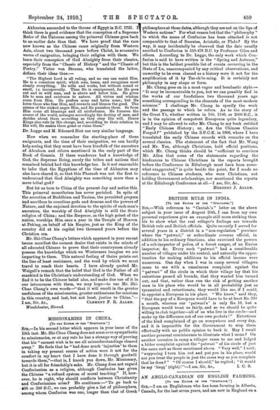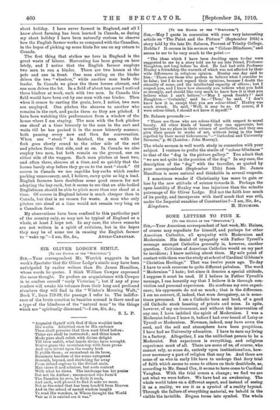AN ANGLO-CANADIAN ON ENGLISH FARMING.
[To THE EDITOR OE THE "SPECTATOR."] Snts—I am an Englishman who has been farming in Alberta, Canada, for the last seven years, and am now in England on a
short holiday. I have never farmed in England, and all I know about farming has been learned in Canada, so during my short holiday I have been naturally curious to observe how the English farmer works as compared with the Canadian, in the hopes of picking up some hints for use on my return to Canada.
The first thing that strikes me here in England is the great waste of labour. Harvesting has been going on here lately, and I notice that the English farmer employs two men to run a binder. There are two horses at the pole and one in front. One man sitting on the binder drives the two " wheelers," while another man leads the leader. In Canada we place the three horses abreast, and one man drives the lot. In a field of about ten acres I noticed three binders at work, each with two men. In Canada this field would have been cut by one man with one binder. Then when it comes to carting the grain, here, I notice, two men are employed. One pitches the sheaves to another who remains in the cart, and packs them as they are pitched. I have been watching this performance from a window of the house where I am staying. The man with the fork pitches one sheaf at a time leisurely to the man in the cart and waits till he has packed it in the same leisurely manner, both pausing every now and then for conversation. When one " stook " is finished, the man with the fork goes slowly round to the other side of the cart and pitches from that side, and so on. In Canada we also employ two men, but both remain on the ground, one on either side of the waggon. Each man pitches at least two, and often three, sheaves at a time, and so quickly that the horses barely stop before they go on to the next " stook." Of course in Canada we use cagelike hay-racks which render packing unnecessary, and, I believe, carry quite as big a load. English farmers have doubtless some good reason for not adopting the hay-rack, but it seems to me that an able-bodied Englishman should be able to pitch more than one sheaf at a time. Of course in England labour is much cheaper than in Canada, but that is no reason for waste. A man who only pitches one sheaf at a time would not remain very long on a Canadian farm.
My observations have been confined to this particular part of the country only, so may not be typical of England as a whole, at least I hope not. In any case, the above remarks are not written in a spirit of criticism, but in the hopes they may be of some use in causing the English farmer to " wake up."—I am, Sir, &c., ANGLO-CANADIAN.











































 Previous page
Previous page